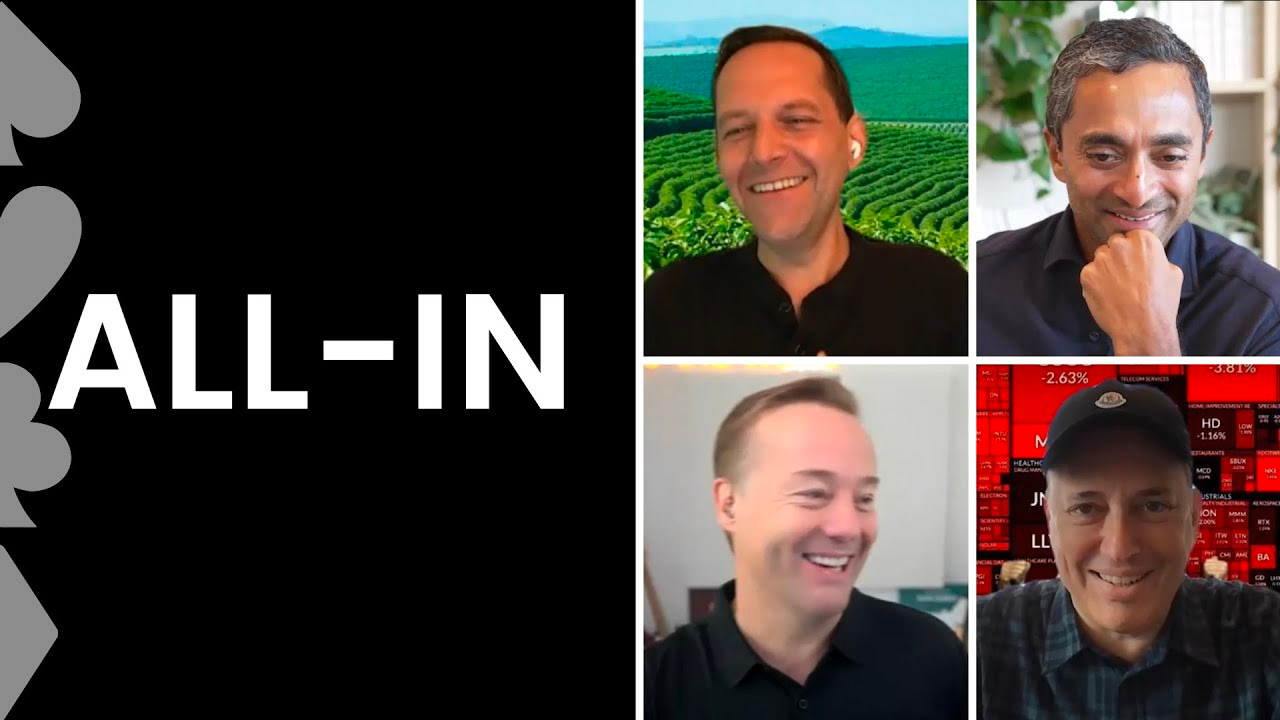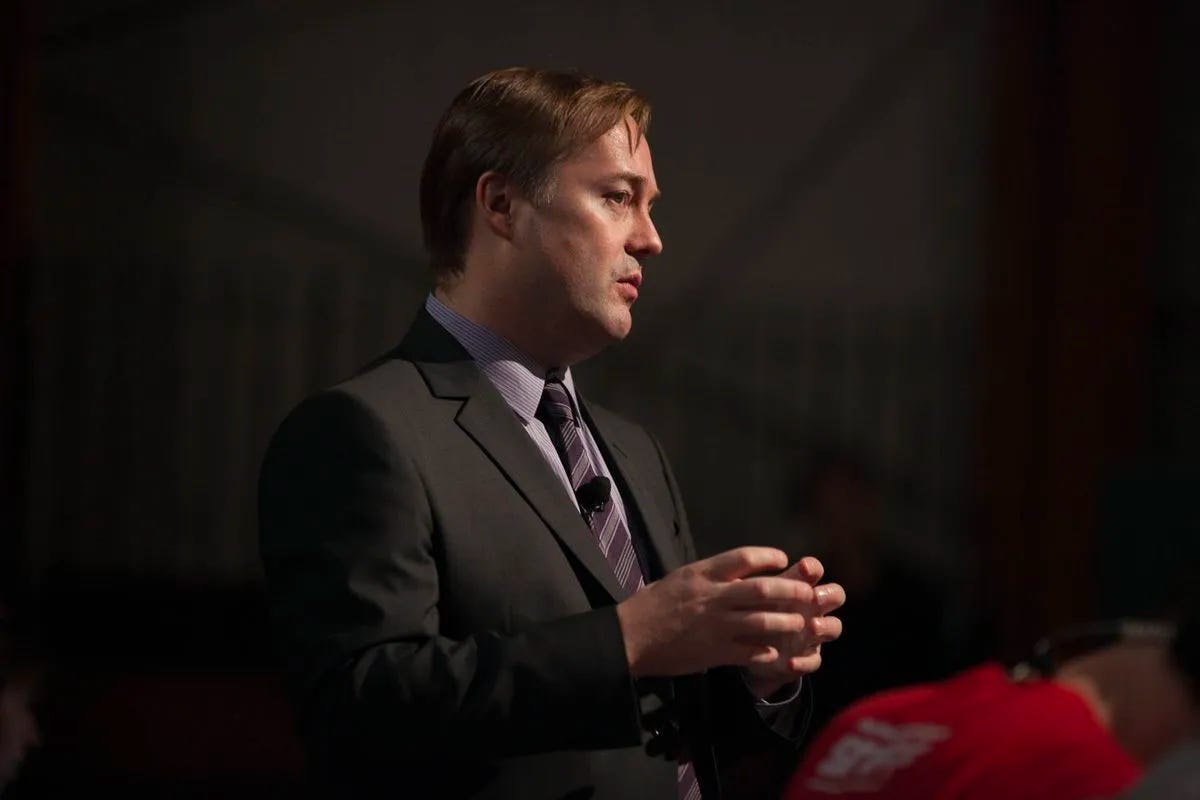How to facilitate like the All In pod - the Jason Calacanis way
How to facilitate like the All In pod - the Jason Calacanis way8 tips, tricks and things to take to your next large meetingLately, we have been getting into the All-in podcast. It is a great source to hear about what is going on in the tech space, economy, and politics and get an insider's point of view. The panel has diverse expertise from investing, working in start-ups as early employees, and starting and selling start-ups. The interesting aspect of this podcast is how the four members very different opinions at all times. Most episodes involve heated discussions on a topic. The four members are Chamath Palihapitiya, David O. Sacks, David Friedberg, and Jason Calacanis (JCal). Source: TwitterJason Calacanis was interviewed by Tim Ferriss and revealed his thoughts and process behind the podcast. He talks about how he facilitates conversation with such differing personalities. He calls it moderation but this facilitation skill can be used in various workplace meetings, especially when there is a HIPPO in the room. These approaches he talked about can be used immediately in your work. Use it when thinking about planning and running a meeting with senior leadership / strong personalities. 1. Each person has a clear roleIn a meeting, everyone knows what they are bringing or offering to that meeting. In the All in podcast case, they each have a different political position and/or expertise. For meetings at work it should be clear why you are gathering these particular people. Is it for a decision to be made, discussion or idea iteration. Calacanis talks about understanding what the boundaries are of each member of the group. As the facilitator and organiser of the meeting, you should have a good sense of what people are and are not willing to discuss. Keeping in mind what their goals are. If you do not, an individual stakeholder interview would give you the opportunity to get to know the person better. 2. Agreed upon signalsCalacanis interestingly talks about signals to move the conversation along. For them, it can be challenging as they are all dialling in, and the podcast is recorded remotely. He has experimented with different ways and does not rely on tooling/technology like Zoom hand raise. This is worth keeping in mind if you bring in external people to a meeting who may be unfamiliar with the tool, and tooling “norms”. Inside your organisation, it is standard to use Zoom hand raise, but your guests may not know about it. Calacanis uses subtle signals that the group understand and are all on the same page about moving the conversation forward. 3. Notes/agenda beforehandThe All in podcast members are all-time poor. As the organiser of the session, Calacanis ensures to share a group-accessible document before their session. The document ensures they are on the same page about what is to be discussed. Members are encouraged to add to the agenda. If the agenda is light Calacanis tags people in to add something or make sure members will need to prepare for a topic. There are clear action items to be done beforehand. This can be replicated easily. Use a meeting agenda, pre-reads with deadlines. With an expectation preparation before a meeting needs to be done to make the meeting as effective as possible. No one should be attending a meeting underprepared if there are decisions to be made if that is the purpose of the meeting. 4. Feedback is given afterOne behind the scenes that was shared by Calacanis is he shares feedback to the other members. It includes notes about what they could be doing more or less. He is trying to bring the best of each personality forward, and as the more experienced podcaster, he knows what works, and what does not. He takes notes and shares those notes with people in a timely manner, so each episode has a round of feedback. This one is not as easy to replicate depending on the culture of your organisation. Keep in mind who is open to feedback. It helps to ask people if they would be open to feedback. If they opt in, then share it with them. The recipients are ready for it and more willing to listen. 5. Agreed upon cadence and format, and channel of communicationThe All in group has an agreed-upon way they communicate between episodes, and in their case it is Signal. If you have regular meetings with a specific group of attendees it is good practice to have a clear channel. Everyone is aligned on where to get updates. The working group is consistently checking it, whether it be a specific Slack group or channel, email, or some other tool. Running the session itself - Calanacis knows each person’s strengths and interests. He uses that to lob questions or gives people an opportunity to shine. If you had a meeting with for example with a UX Researcher, a Product Manager and a Software Engineer. You would be amiss not to ask the Engineer to talk about technical feasibility. 6. Observe and take inspiration from other formats or peopleEven though Calacanis has been doing his own podcast for some time, he still takes a growth mindset approach. He learns from other podcasts, hosts and media. You can do that too by observing and emulating how others do things if it resonates with you. He takes notes and applies certain things. 7. Review your own skillsNot only does Calacanis give notes he also takes the time to take on some feedback and review his own style. It is a bit more organic for the All in podcast because people leave comments on YouTube, twitter and send it in. When people are anonymous they can be more direct, or even harsh. Nonetheless has taken on some of that feedback. In an organisation setting you may have to solicit feedback as it may not come through organically. 8. Parking lot - a chance to circle back to interesting points or topicsCalacanis talks about using a technique where if a speaker goes off topic he will try to redirect back to the original topic. He makes a note of it to come back to it later if time permits. Using an ideas or topic “parking lot” that is very visible to attendees is always helpful with a large group. They do not need to feel like they have to say everything all at once and not give the others an opportunity to speak. Often at work, the purpose of a meeting is to make sure everyone is on the same page. Some form of agreement needs to happen to move things forward. Calacanis’ goal for the podcast is debate and interest. It is always good to take inspiration from others but also remain true to yourself and your own style if it works for you. Additional articles that are relevant: Source: Calacanis.comNotable timestamps if you want to hear the discussion in Calacanis’ own words:
Thank you for reading the article! You can help us:✉️ Subscribe using this button ⏩ Share this directly with your peers and others who will find this helpful. Apply what you have learned and teach it to someone else, it will make it easier to recall later. 💬 Share this article on your Social Media (Twitter (we’re @readaskwhy), LinkedIn) ❓ Suggest topics or ask us a question 📥 Email us your questions, comments, and ideas. Simply reply to this email to contact us. If your friends, peers or colleagues could benefit from this article or the Askwhy newsletter, share it with them today. They can learn and grow too. Follow us on Twitter @readaskwhy |
Older messages
Your company is having layoffs or is about to - what you should do
Monday, November 21, 2022
A checklist to help you transition from your current role to the next
Masterclass recommendations for UX Researchers and UX Designers
Monday, November 7, 2022
Top courses you should prioritize to level up as a UX person
Handling customer escalations calls
Wednesday, October 19, 2022
Turn a potentially negative experience into a positive one
User Experience Research (UXR) for Engineers
Friday, September 23, 2022
Why should you care what the user says and what to do about it
Building a strong relationship with Engineering x Product Management
Wednesday, August 31, 2022
How to collaborate with Tech Leads and Architects
You Might Also Like
🐺 How to create a high impact press page.
Friday, February 14, 2025
͏ ͏ ͏ ͏ ͏ ͏ ͏ ͏ ͏ ͏ ͏ ͏ ͏ ͏ ͏ ͏ ͏ ͏ ͏ ͏ ͏ ͏ ͏ ͏ ͏ ͏ ͏ ͏ ͏ ͏ ͏ ͏ ͏ ͏ ͏ ͏ ͏ ͏ ͏ ͏ ͏ ͏ ͏ ͏ ͏ ͏ ͏ ͏ ͏ ͏ ͏
#494: UX and Product Design
Friday, February 14, 2025
Redesigning complex navigation, product design process, UX in legacy systems, UX workshops with users. Issue #494 • Feb 11, 2025 • View in the browser Smashing Newsletter Halò Smashing Friends, How do
Nick Mafi on Capturing LA’s Loss
Friday, February 14, 2025
View in your browser | Update your preferences ADPro 77 Stories Shared As we watched the worst fires in Los Angeles history spread across the city, the editors at AD came together to discuss the
🐺 Content that Converts - the replay is up!
Friday, February 14, 2025
And everyone who joined loved it! ͏ ͏ ͏ ͏ ͏ ͏ ͏ ͏ ͏ ͏ ͏ ͏ ͏ ͏ ͏ ͏ ͏ ͏ ͏ ͏ ͏ ͏ ͏ ͏ ͏ ͏ ͏ ͏ ͏ ͏ ͏ ͏ ͏ ͏ ͏ ͏ ͏ ͏ ͏ ͏ ͏ ͏
Designer or Couple’s Therapist?
Friday, February 14, 2025
View in your browser | Update your preferences ADPro Let's Make a Deal There's no shortage of spoils in the wonderfully eclectic Hudson Valley home of actor Walton Goggins and writer-director
178 / Visualize your dreams in 2025
Wednesday, January 15, 2025
Product Disrupt Logo Product Disrupt Half-Monthly Jan 2025 • Part 1 View in browser Welcome to Issue 178 Ever get curious about how this newsletter is doing? I shared the 2024 behind-the-scenes and
Mayer Rus on Loss, and Living, in LA
Tuesday, January 14, 2025
View in your browser | Update your preferences ADPro LA, I Love You Los Angeles has been my home for nearly 20 years, and the devastation here, now, is unfathomable. Entire neighborhoods have been
🐺 How to make a great first impression
Tuesday, January 14, 2025
With real examples. ͏ ͏ ͏ ͏ ͏ ͏ ͏ ͏ ͏ ͏ ͏ ͏ ͏ ͏ ͏ ͏ ͏ ͏ ͏ ͏ ͏ ͏ ͏ ͏ ͏ ͏ ͏ ͏ ͏ ͏ ͏ ͏ ͏ ͏ ͏ ͏ ͏ ͏ ͏ ͏ ͏ ͏ ͏ ͏ ͏ ͏ ͏ ͏ ͏ ͏ ͏ ͏ ͏ ͏ ͏ ͏ ͏ ͏ ͏ ͏ ͏ ͏ ͏ ͏ ͏ ͏ ͏ ͏ ͏ ͏ ͏ ͏ ͏ ͏ ͏ ͏ ͏ ͏ ͏ ͏ ͏ ͏ ͏ ͏ ͏ ͏ ͏ ͏ ͏ ͏ ͏
#490: Interface Design
Tuesday, January 14, 2025
How to design better interfaces, how to choose icons, optical effects, iconography, Gestalt principles and icon design. Issue #490 • Jan 14, 2025 • View in the browser Smashing Newsletter Buona
🐺LAST CHANCE to get 20%-off our PR Masterclass Series
Monday, January 13, 2025
Make 2025 your biggest press year yet. ͏ ͏ ͏ ͏ ͏ ͏ ͏ ͏ ͏ ͏ ͏ ͏ ͏ ͏ ͏ ͏ ͏ ͏ ͏ ͏ ͏ ͏ ͏ ͏ ͏ ͏ ͏ ͏ ͏ ͏ ͏ ͏ ͏ ͏ ͏ ͏ ͏ ͏ ͏ ͏ ͏ ͏ ͏ ͏ ͏ ͏ ͏ ͏ ͏ ͏ ͏ ͏ ͏ ͏ ͏ ͏ ͏ ͏ ͏ ͏ ͏ ͏ ͏ ͏ ͏ ͏ ͏ ͏ ͏ ͏ ͏ ͏ ͏ ͏ ͏ ͏ ͏ ͏ ͏ ͏ ͏



